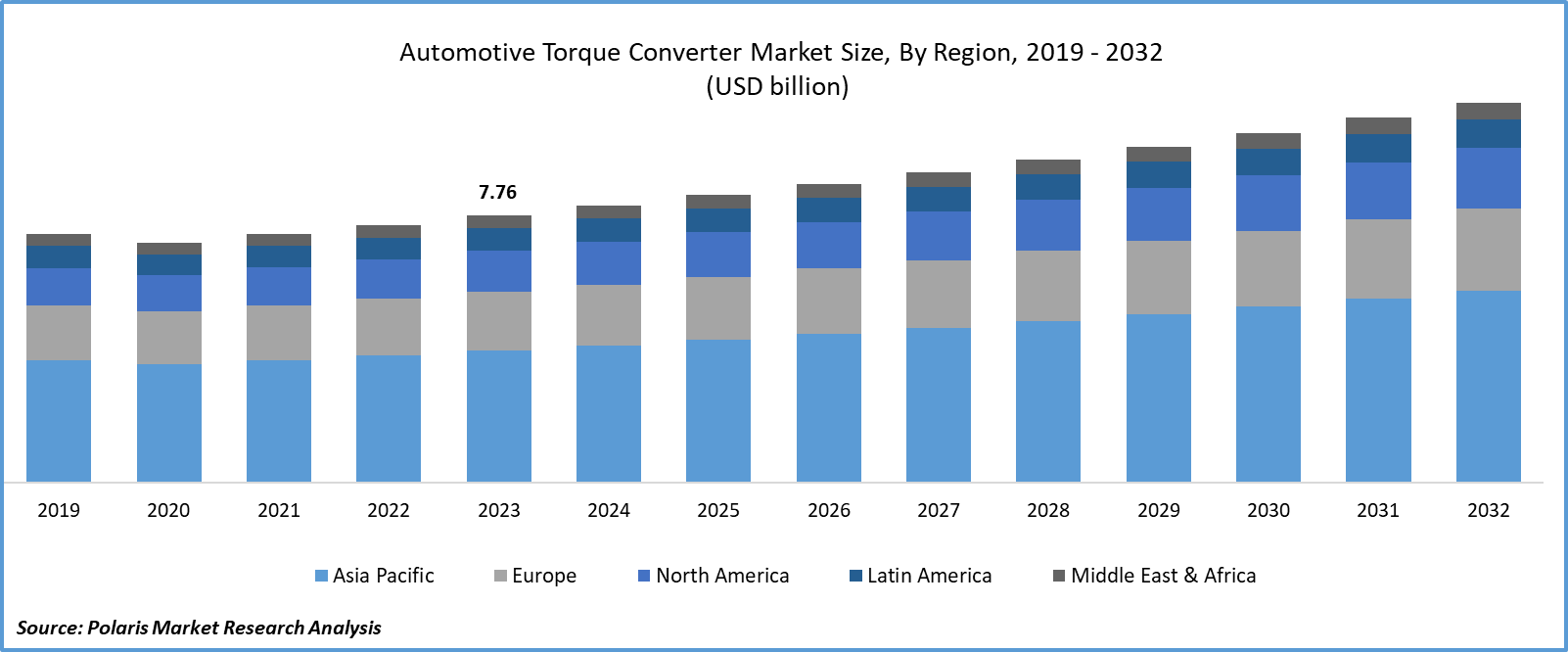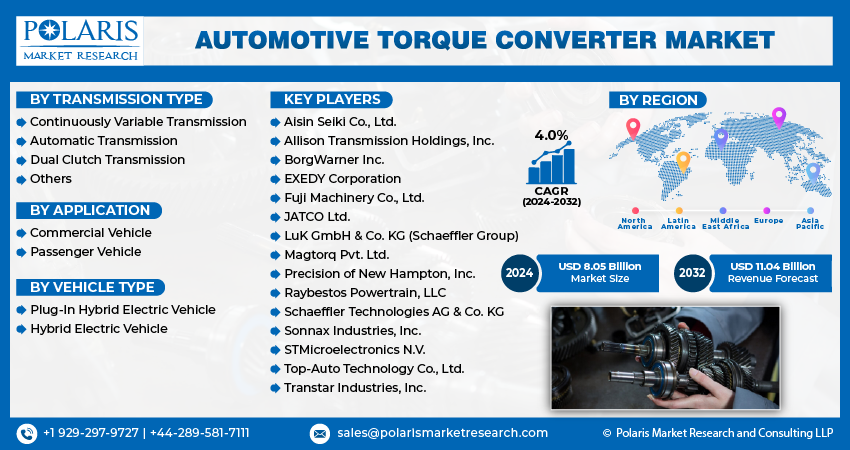
Automotive Torque Converter Market Share, Size, Trends, Industry Analysis Report, By Transmission Type (Continuously Variable Transmission, Automatic Transmission, Dual Clutch Transmission, and Others); By Application; By Vehicle Type; By Region; Segment Forecast, 2024 - 2032
- Published Date:Dec-2023
- Pages: 115
- Format: PDF
- Report ID: PM4151
- Base Year: 2023
- Historical Data: 2019-2022
Report Outlook
The global automotive torque converter market was valued at USD 7.76 billion in 2023 and is expected to grow at a CAGR of 4.0% during the forecast period.
The stringent regulations and emission standards imposed by governments have cast a significant influence over the automotive sector. As the automotive industry strives to curtail carbon emissions, torque converters are being reengineered to synergize with hybrid and electric powertrains. This transition toward cleaner and more efficient powertrain solutions presents both challenges and opportunities for torque converter manufacturers.

To Understand More About this Research: Request a Free Sample Report
The evolving preferences of consumers represent yet another pivotal factor that shapes this market. Contemporary consumers seek vehicles that offer a seamless and comfortable driving experience. Torque converters play a pivotal role in delivering smooth gear transitions and minimizing power wastage. Consequently, automakers are increasingly inclined to incorporate advanced torque converters to align with the demands of their customer base.
- For instance, in July 2023, Toyota Kirloskar Motor, the renowned Japanese automotive conglomerate, is primed to create a significant impact in the Indian automotive sector with the eagerly awaited introduction of the Toyota Rumion. This vehicle is built on the foundation of the Maruti Suzuki Ertiga, and its arrival is highly anticipated.
The surge in hybrid and electric vehicle production presents a substantial opportunity for the automotive torque converter market. As these vehicles require specialized torque converters to optimize power transfer, manufacturers can tap into this growing market segment. Torque converter manufacturers have the opportunity to invest in research and development to create more efficient and lightweight designs. Innovation in materials, such as advanced composites, can help reduce costs and improve overall performance.
However, despite the manifold advantages offered by advanced torque converters, their development and production expenses can be notably high. This elevated cost factor serves as a substantial constraint, particularly for price-conscious consumers and manufacturers aiming to sustain competitive pricing. Moreover, as environmental consciousness burgeons, mounting pressure is placed upon the automotive industry to mitigate carbon emissions. Despite its contributions to improved fuel efficiency, the torque converter remains associated with automatic transmissions, which may sometimes lag behind the efficiency of manual transmissions or cutting-edge technologies like CVTs and electric drivetrains. These environmental concerns have the potential to influence the market profoundly, especially in regions subject to stringent emissions regulations.

For Specific Research Requirements, Request for a Customized Research Report
Growth Drivers
- Expansion in the automotive sector is projected to spur the product demand.
The sustained expansion of the global automotive sector stands as a prominent catalyst propelling the torque converter market forward. The escalating production of vehicles across the globe, encompassing passenger cars, commercial vehicles, and off-road machinery, ignites an ever-increasing need for torque converters.
Moreover, the inclination towards automatic transmissions, in contrast to manual alternatives, has experienced a consistent upswing. Automatic transmissions provide convenience and user-friendliness, particularly in densely populated urban settings. This transition has triggered a pronounced upsurge in demand for torque converters, which constitute an indispensable component of automatic transmission systems. Thereby, contributing to the growth of automotive torque converter market.
Report Segmentation
The market is primarily segmented based on transmission type, application, vehicle type and region.
|
By Transmission Type |
By Application |
By Vehicle Type |
By Region |
|
|
|
|
To Understand the Scope of this Report: Speak to Analyst
By Transmission Type Analysis
- Automatic Transmission segment is expected to witness highest growth during forecast period
The automatic transmission segment is witnessing substantial growth in the automotive torque converter market. This expansion is driven by the increasing consumer preference for automatic transmissions due to their convenience and ease of use. In urban and congested environments, automatic transmissions have become the favored choice, contributing significantly to this segment's growth. Moreover, ongoing technological advancements have led to more efficient and responsive automatic transmission systems, enhancing both driving experiences and fuel efficiency. As the automotive industry strives to meet stricter environmental standards, the Automatic Transmission segment plays a pivotal role in reducing carbon emissions, making it a key driver of the torque converter market's overall growth and evolution.
By Application Analysis
- Passenger vehicle segment accounted for the largest market share in 2023
The passenger vehicle segment accounted for the largest market share in 2023 and is likely to retain its market position throughout the forecast period. This expansion can be attributed to several key factors. First and foremost, the ever-increasing global demand for passenger cars, driven by rising disposable incomes and urbanization, has been a primary catalyst. As more people choose personal vehicles for their daily commute, the demand for automatic transmissions and, consequently, torque converters in passenger vehicles has surged.
Furthermore, a growing trend toward comfort and convenience has bolstered this segment's growth. Passenger car buyers increasingly prefer the smooth, effortless gear shifting and improved driving experience offered by automatic transmissions, making torque converters an essential component. With manufacturers constantly innovating to enhance fuel efficiency and performance, the Passenger Vehicle segment remains at the forefront of the torque converter market's expansion, poised for sustained growth in the years ahead.
By Vehicle Type Analysis
- Hybrid Electric Vehicle segment held the significant market revenue share in 2023
The Hybrid Electric Vehicle (HEV) segment is witnessing a noteworthy surge in the automotive torque converter market. This expansion is predominantly driven by the growing global shift towards cleaner and more sustainable transportation solutions. HEVs, with their combination of internal combustion engines and electric propulsion, rely on advanced torque converters to optimize power transmission between these sources.
Moreover, government incentives and environmental regulations aimed at reducing carbon emissions have incentivized automakers and consumers to embrace HEVs. This trend has led to a substantial uptick in the demand for torque converters specifically tailored to these hybrid powertrains. The torque converter's role in seamlessly blending power sources, enhancing fuel efficiency, and delivering a smoother driving experience is pivotal in the HEV segment's growth. As the automotive industry increasingly embraces electrification, the Hybrid Electric Vehicle segment is poised to remain a dynamic and expanding market for torque converter manufacturers.
Regional Insights
- North America region dominated the global market in 2023
The North America region dominated the global market with the largest market share in 2023 and is expected to maintain its dominance over the anticipated period. The growth of the segment market can be largely attributed due to increasing consumer purchasing power, and a fondness for larger vehicles, particularly trucks and SUVs, have fueled the demand for automatic transmissions equipped with torque converters. This trend extends beyond passenger vehicles to commercial and off-road applications.
Stringent environmental regulations and emission standards in North America are promoting the integration of advanced torque converters in vehicles, helping manufacturers meet fuel efficiency and emissions targets. Additionally, the growing popularity of hybrid and electric vehicles in the region presents a lucrative market for specialized torque converters designed to complement these powertrains.
The Asia-Pacific is expected to be the fastest growing region. In China and India, the automotive torque converter market is experiencing remarkable growth. As these nations continue to witness robust economic development, an expanding middle class, and increasing urbanization, there is a surging demand for vehicles. Moreover, stringent emissions regulations are pushing the adoption of advanced torque converters, particularly in hybrid and electric vehicles. These factors, along with changing consumer preferences, key growth areas in the Asia-Pacific automotive torque converter market.
Key Market Players & Competitive Insights
The automotive torque converter market is fragmented and is anticipated to witness competition due to several players' presence. Major service providers in the market are constantly upgrading their technologies to stay ahead of the competition and to ensure efficiency, integrity, and safety. These players focus on partnership, product upgrades, and collaboration to gain a competitive edge over their peers and capture a significant market share.
Some of the major players operating in the global market include:
- Aisin Seiki Co., Ltd.
- Allison Transmission Holdings, Inc.
- BorgWarner Inc.
- EXEDY Corporation
- Fuji Machinery Co., Ltd.
- JATCO Ltd.
- LuK GmbH & Co. KG (Schaeffler Group)
- Magtorq Pvt. Ltd.
- Precision of New Hampton, Inc.
- Raybestos Powertrain, LLC
- Schaeffler Technologies AG & Co. KG
- Sonnax Industries, Inc.
- STMicroelectronics N.V.
- Top-Auto Technology Co., Ltd.
- Transtar Industries, Inc.
Recent Developments
- In October 2023, The impending launch of the Kia Sonet in India is generating significant excitement, primarily due to the multitude of pioneering features it's set to introduce in the subcompact SUV segment. Notably, the Sonet will mark the debut of the first-ever torque converter diesel automatic drivetrain in this category. Intriguingly, this transmission will deliver a more potent power output compared to its diesel manual counterpart.
Automotive Torque Converter Market Report Scope
|
Report Attributes |
Details |
|
Market size value in 2024 |
USD 8.05 billion |
|
Revenue forecast in 2032 |
USD 11.04 billion |
|
CAGR |
4.0% from 2024 – 2032 |
|
Base year |
2023 |
|
Historical data |
2019 – 2022 |
|
Forecast period |
2024 – 2032 |
|
Quantitative units |
Revenue in USD billion and CAGR from 2024 to 2032 |
|
Segments covered |
By Transmission Type, By Application, By Vehicle Type, By Region |
|
Regional scope |
North America, Europe, Asia Pacific, Latin America; Middle East & Africa |
|
Customization |
Report customization as per your requirements with respect to countries, region and segmentation. |
FAQ's
The automotive torque converter market report covering key segments are transmission type, application, vehicle type and region.
Automotive Torque Converter Market Size Worth $11.04 Billion By 2032
The global automotive torque converter market is expected to grow at a CAGR of 4.0% during the forecast period.
North America is leading the global market
key driving factors in automotive torque converter market are expansion in the automotive sector is projected to spur the product demand
